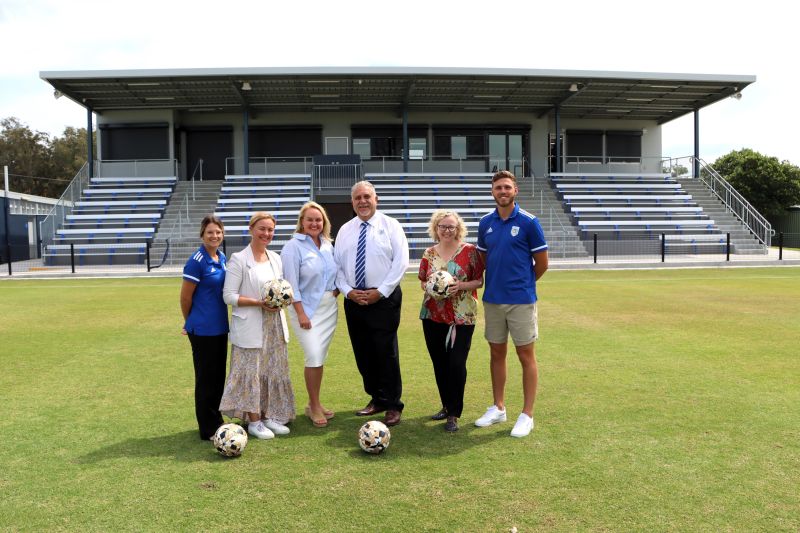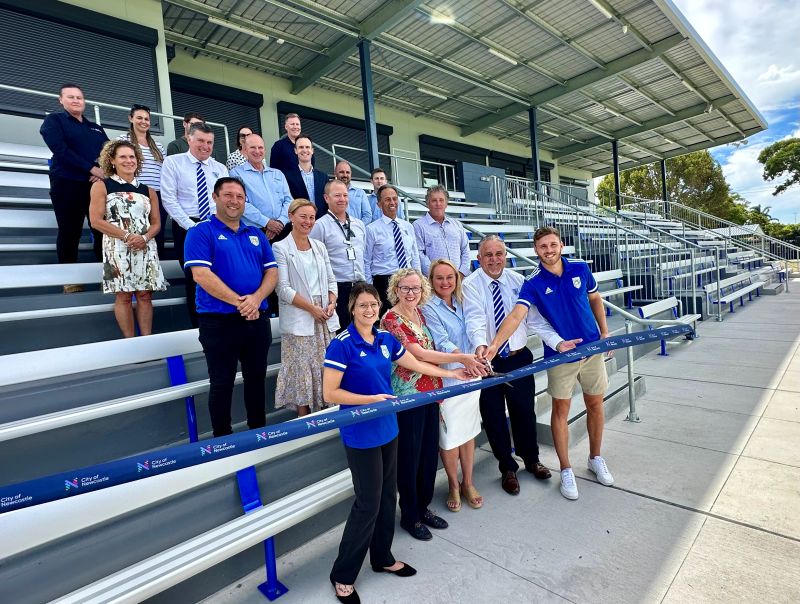Darling Street Oval is better equipped to cater for the growth of women’s football in our region thanks to the completion of an upgrade at Hamilton South valued at over $3 million.
The project, funded by City of Newcastle (CN), Newcastle Olympic Football Club and the State and Federal Governments, has delivered an inclusive and fully accessible grandstand for passionate spectators, as well as male and female players.
 Newcastle Olympic Women’s Captain Jemma House, Chair of City of Newcastle’s Sports Infrastructure Working Party Councillor Peta Winney-Baartz, Newcastle Lord Mayor Nuatali Nelmes, Newcastle Olympic Football Club President George Sofianos, Federal Member for Newcastle Sharon Claydon and Newcastle Olympic Men’s Captain Marcus Duncan at the official opening of the new grandstand at Darling Street Oval.
Newcastle Olympic Women’s Captain Jemma House, Chair of City of Newcastle’s Sports Infrastructure Working Party Councillor Peta Winney-Baartz, Newcastle Lord Mayor Nuatali Nelmes, Newcastle Olympic Football Club President George Sofianos, Federal Member for Newcastle Sharon Claydon and Newcastle Olympic Men’s Captain Marcus Duncan at the official opening of the new grandstand at Darling Street Oval.
Replacing the original grandstand, which was built in 1993, the facility includes a new grandstand with gender inclusive changerooms, a training room, a media room, as well as a new canteen, medical room and referee room.
The tiered seating can accommodate 340 spectators with an increased number under cover, while the new secure internal storage provides protection for sports equipment, which is used by more than 480 players.
Lord Mayor Nuatali Nelmes said the project aligns with City of Newcastle’s Strategic Sports Plan.
“The provision of high-quality amenities within the new grandstand provides for greater female participation in sport,” Cr Nelmes said.
“City of Newcastle is committed to investing in inclusive facilities that cater for the entire community.
“The upgrade includes a lift and amenities for people with a disability on both levels, as well as accessible car parking and pathways to improve the approach to the grandstand.”
Federal Member for Newcastle Sharon Claydon MP said the new facilities will be welcomed by the whole community.
“Newcastle Olympic FC has invested proudly in growing women’s football and will finally have the facilities to support its female athletes from the most junior to the top-tier,” Ms Claydon said.
“The Albanese Labor Government is proud to partner with state and local government to support these new facilities. This will help ensure women and girls find their feet in sport and hopefully remain engaged throughout their lives.”
NSW Minister for the Hunter Yasmin Catley said the new grandstand would be a well-used facility.
“You just have to look outside to know women’s sport is booming in the Hunter and these are top class facilities for both men’s and women’s teams and their supporters,” Minister Catley said.
“It’s fantastic to see all three levels of government work together with a sporting club to deliver a venue like this for Hamilton South.
“I’m proud to be part of a NSW Government that has contributed more than $1.2 million to this game-changing upgrade for the community.”
 Celebrating the opening of the new grandstand at Darling Street Oval.
Celebrating the opening of the new grandstand at Darling Street Oval.
Newcastle Olympic Football Club President George Sofianos said the new facility offers invaluable benefits to the club.
“This new pavilion is a watershed moment for Newcastle Olympic as we approach our 50th anniversary in 2026. We are immensely proud that the club formed by a group of young boys of Greek heritage all those years ago, has grown into one of the leaders in both women’s and men’s football in this region,” Mr Sofianos said.
“Commencing our women’s program in 2020 is one of the best decisions we have ever made. We have been the women’s Club Champions in four of the past five years and we have featured in every top-flight grand final in that time.
“Northern NSW Football has set a goal of having 30,000 female participants by 2026 and we’re well placed to welcome new players to the club.
“This new facility means Darling Street Oval will be one of the few football facilities in the area with four changerooms and match official rooms, all of which are female friendly.”

 Newcastle Olympic Women’s Captain Jemma House, Chair of City of Newcastle’s Sports Infrastructure Working Party Councillor Peta Winney-Baartz, Newcastle Lord Mayor Nuatali Nelmes, Newcastle Olympic Football Club President George Sofianos, Federal Member for Newcastle Sharon Claydon and Newcastle Olympic Men’s Captain Marcus Duncan at the official opening of the new grandstand at Darling Street Oval.
Newcastle Olympic Women’s Captain Jemma House, Chair of City of Newcastle’s Sports Infrastructure Working Party Councillor Peta Winney-Baartz, Newcastle Lord Mayor Nuatali Nelmes, Newcastle Olympic Football Club President George Sofianos, Federal Member for Newcastle Sharon Claydon and Newcastle Olympic Men’s Captain Marcus Duncan at the official opening of the new grandstand at Darling Street Oval. Celebrating the opening of the new grandstand at Darling Street Oval.
Celebrating the opening of the new grandstand at Darling Street Oval.